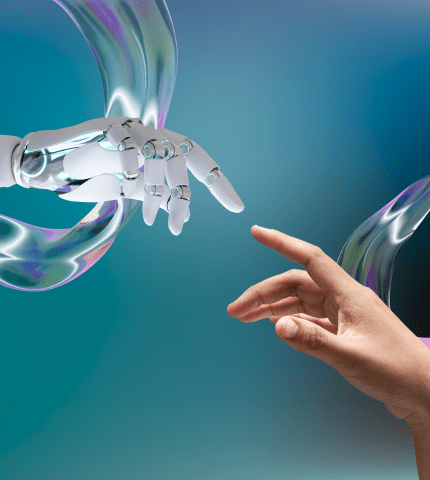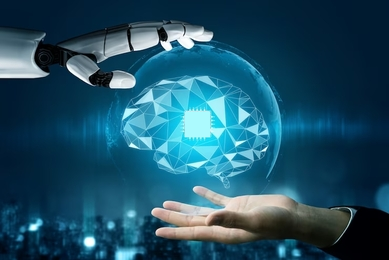Artificial Intelligence (AI) is rapidly transforming the future of businesses across various industries. With advancements in machine learning, natural language processing, and deep learning, AI has become a game-changer for businesses that want to stay competitive and grow in today’s digital age.
Undoubtedly, AI/ML is the present and future of the digital landscape, and failing to integrate AI into your company’s system could result in falling behind your competitors. This is particularly concerning given that the AI market is projected to achieve the $500 billion milestone by 2024.
Artificial intelligence has numerous applications in the business world, and many of us encounter it on a daily basis in some way. AI is already revolutionizing virtually every aspect of business processes across industries, ranging from routine to awe-inspiring tasks. As AI continues to spread, it is becoming increasingly necessary to adopt it to stay competitive.
7 Key Ways of How AI Is Revolutionizing the Business Landscape
-
Predictive analytics: AI-powered predictive analytics is revolutionizing the way businesses analyze customer data and behavior. By using machine learning algorithms, businesses can predict customer needs and preferences, identify patterns, and make informed decisions.
-
Personalized customer experiences: AI is enabling businesses to create personalized experiences for customers. By analyzing customer data and behavior, AI can recommend personalized products, services, and marketing messages that are tailored to each customer’s needs and preferences.
-
Chatbots and virtual assistants: AI-powered chatbots and virtual assistants are transforming customer service by providing instant assistance to customers. They can answer frequently asked questions, help customers navigate websites, and provide personalized recommendations.
-
Automation: AI is automating repetitive tasks, such as data entry and processing, which allows businesses to focus on higher-level tasks that require human creativity and innovation.
-
Enhanced decision-making: AI can analyze vast amounts of data and provide insights that help businesses make informed decisions. This helps companies identify opportunities and risks, optimize operations, and improve performance.
-
Improved cybersecurity: AI is being used to detect and prevent cybersecurity threats. AI algorithms can analyze network traffic, identify anomalies, and block attacks in real time.
-
Supply chain optimization: AI is optimizing supply chain operations by predicting demand, optimizing inventory levels, and reducing shipping costs. This helps businesses save money, improve efficiency, and reduce waste.
AI: The Game-Changer in Top Industries Success and Beyond
Here are a few use cases of how AI is transforming the future of businesses across industries:
-
Healthcare: AI is transforming the healthcare industry by improving patient outcomes, reducing costs, and increasing efficiency. For example, AI-powered medical imaging tools can accurately detect and diagnose diseases such as cancer, saving time and improving patient outcomes.
-
Retail: AI is transforming the retail industry by providing personalized customer experiences and optimizing supply chain operations. For example, retailers can use AI-powered recommendation engines to suggest products that are tailored to each customer’s preferences, increasing customer satisfaction and sales.
-
Finance: AI is transforming the finance industry by automating repetitive tasks such as fraud detection and loan underwriting, improving efficiency and reducing costs. For example, banks can use AI-powered fraud detection tools to identify and prevent fraudulent transactions in real-time.
-
Manufacturing: AI is transforming the manufacturing industry by optimizing production processes and reducing waste. For example, manufacturers can use AI-powered predictive maintenance tools to detect potential equipment failures before they occur, reducing downtime and maintenance costs.
-
Transportation: AI is transforming the transportation industry by optimizing logistics and improving safety. For example, logistics companies can use AI-powered route optimization tools to reduce fuel consumption and delivery times, while autonomous vehicles are improving safety on the roads.
-
Marketing: AI is transforming the marketing industry by providing insights into customer behavior and preferences. For example, marketers can use AI-powered tools to analyze customer data and create targeted marketing campaigns that are more likely to resonate with their target audience.
-
Agriculture: AI is transforming the agriculture industry by improving crop yields and reducing waste. For example, farmers can use AI-powered tools to monitor crop health, identify potential issues, and optimize irrigation and fertilization, resulting in higher yields and reduced waste.
As AI continues to evolve, it will play an increasingly important role in driving innovation and growth in businesses across the globe.
Moving ahead, let’s shed some light on the future of AI in business industries
Revolutionizing the Business World: An Exciting Glimpse into the Future of AI
The future of AI in business industries is promising as AI technologies continue to evolve and businesses become more reliant on data-driven decision-making. Here are some potential trends for the future of AI in business industries:
-
Increased adoption of AI: As businesses become more familiar with AI technologies, they will be more likely to incorporate AI into their operations. This will lead to increased efficiency, cost savings, and improved decision-making.
-
Integration with other emerging technologies: AI is likely to be integrated with other emerging technologies such as blockchain and the Internet of Things (IoT) to create even more powerful applications. For example, AI-powered sensors in a manufacturing plant could be used to monitor production processes and automatically adjust settings to optimize efficiency and reduce waste.
-
More personalized customer experiences: AI-powered recommendation engines and chatbots will continue to improve the customer experience by providing more personalized recommendations and assistance. As AI becomes more sophisticated, it will be able to interpret customer data to provide even more targeted and customized experiences.
-
Expansion into new industries: As AI technologies become more advanced, they will be adopted in new industries and applications. For instance, AI could be used in the legal industry to analyze contracts and identify potential risks or in the education industry to personalize learning experiences for students.
-
Ethical considerations: As AI becomes more integrated into businesses, there will be increased scrutiny and debate around ethical considerations such as bias, privacy, and data security. Businesses will need to be transparent and responsible in their use of AI to build trust with their customers and stakeholders.
-
Continued advancements in AI research: As AI research continues to advance, businesses will benefit from new breakthroughs in areas such as natural language processing, deep learning, and computer vision. These advancements will enable even more sophisticated applications of AI in business industries.
In short, the future of AI in business industries is bright, with the potential for increased efficiency, cost savings, and improved decision-making.
Conclusion
It’s indisputable that AI is revolutionizing modern businesses by providing convenience, accessibility, automation, and efficiency. These benefits are directly linked to increased productivity and improved user experiences.
By leveraging AI, businesses can expand their reach and cultivate enduring customer connections, resulting in enhanced customer loyalty and a steady stream of revenue.
As AI continues to grow and advance, it’s essential to upgrade your business operations by abandoning legacy systems and integrating AI technology.



